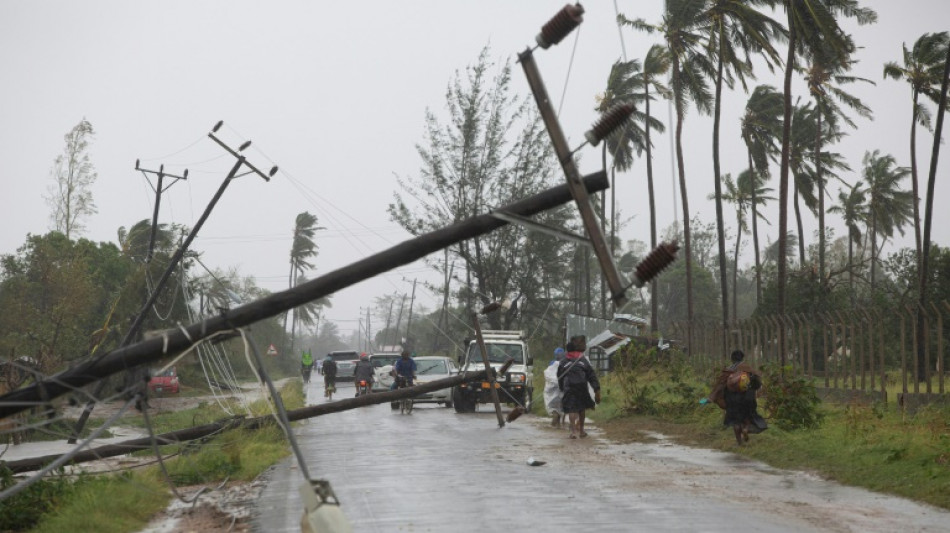
-
 Turkey bans elective C-sections at private medical centres
Turkey bans elective C-sections at private medical centres
-
Lebanon army says 3 troops killed in munitions blast in south

-
 N.America moviegoers embrace 'Sinners' on Easter weekend
N.America moviegoers embrace 'Sinners' on Easter weekend
-
Man Utd 'lack a lot' admits Amorim after Wolves loss

-
 Arteta hopes Arsenal star Saka will be fit to face PSG
Arteta hopes Arsenal star Saka will be fit to face PSG
-
Ukrainian troops celebrate Easter as blasts punctuate Putin's truce

-
 Rune defeats Alcaraz to win Barcelona Open
Rune defeats Alcaraz to win Barcelona Open
-
Outsider Skjelmose in Amstel Gold heist ahead of Pogacar and Evenepoel

-
 Arsenal make Liverpool wait for title party, Chelsea beat Fulham
Arsenal make Liverpool wait for title party, Chelsea beat Fulham
-
Trump slams 'weak' judges as deportation row intensifies

-
 Arsenal stroll makes Liverpool wait for title as Ipswich face relegation
Arsenal stroll makes Liverpool wait for title as Ipswich face relegation
-
Sabalenka to face Ostapenko in Stuttgart final

-
 Kohli, Padikkal guide Bengaluru to revenge win over Punjab
Kohli, Padikkal guide Bengaluru to revenge win over Punjab
-
US aid cuts strain response to health crises worldwide: WHO

-
 Birthday boy Zverev roars back to form with Munich win
Birthday boy Zverev roars back to form with Munich win
-
Ostapenko eases past Alexandrova into Stuttgart final

-
 Zimbabwe on top in first Test after Bangladesh out for 191
Zimbabwe on top in first Test after Bangladesh out for 191
-
De Bruyne 'surprised' over Man City exit

-
 Frail Pope Francis takes to popemobile to greet Easter crowd
Frail Pope Francis takes to popemobile to greet Easter crowd
-
Lewandowski injury confirmed in blow to Barca quadruple bid

-
 Russia and Ukraine accuse each other of breaching Easter truce
Russia and Ukraine accuse each other of breaching Easter truce
-
Zimbabwe bowl Bangladesh out for 191 in first Test in Sylhet

-
 Ukrainians voice scepticism on Easter truce
Ukrainians voice scepticism on Easter truce
-
Pope wishes 'Happy Easter' to faithful in appearance at St Peter's Square

-
 Sri Lanka police probe photo of Buddha tooth relic
Sri Lanka police probe photo of Buddha tooth relic
-
Home hero Wu wows Shanghai crowds by charging to China Open win

-
 Less Soviet, more inspiring: Kyrgyzstan seeks new anthem
Less Soviet, more inspiring: Kyrgyzstan seeks new anthem
-
Defending champion Kyren Wilson crashes out in first round of World Snooker Championship

-
 NASA's oldest active astronaut returns to Earth on 70th birthday
NASA's oldest active astronaut returns to Earth on 70th birthday
-
Exec linked to Bangkok building collapse arrested

-
 Zelensky says Russian attacks ongoing despite Putin's Easter truce
Zelensky says Russian attacks ongoing despite Putin's Easter truce
-
Vaibhav Suryavanshi: the 14-year-old whose IPL dream came true

-
 Six drowning deaths as huge waves hit Australian coast
Six drowning deaths as huge waves hit Australian coast
-
Ukrainian soldiers' lovers kept waiting as war drags on

-
 T'Wolves dominate Lakers, Nuggets edge Clippers as NBA playoffs start
T'Wolves dominate Lakers, Nuggets edge Clippers as NBA playoffs start
-
Taxes on super rich and tech giants stall under Trump

-
 Star Wars series 'Andor' back for final season
Star Wars series 'Andor' back for final season
-
Neighbours improvise first aid for wounded in besieged Sudan city

-
 Tariffs could lift Boeing and Airbus plane prices even higher
Tariffs could lift Boeing and Airbus plane prices even higher
-
Analysts warn US could be handing chip market to China

-
 Unbeaten Miami edge Columbus in front of big MLS crowd in Cleveland
Unbeaten Miami edge Columbus in front of big MLS crowd in Cleveland
-
Social media helps fuel growing 'sex tourism' in Japan

-
 'Pandora's box': alarm bells in Indonesia over rising military role
'Pandora's box': alarm bells in Indonesia over rising military role
-
Alaalatoa hails 'hustling hard' Brumbies for rare Super Rugby clean sheet

-
 Trio share lead at tight LA Championship
Trio share lead at tight LA Championship
-
Sampdoria fighting relegation disaster as old heroes ride into town

-
 Recovering pope expected to delight crowds at Easter Sunday mass
Recovering pope expected to delight crowds at Easter Sunday mass
-
Nuggets edge Clippers in NBA playoff overtime thriller, Knicks and Pacers win

-
 Force skipper clueless about extra-time rules in pulsating Super Rugby draw
Force skipper clueless about extra-time rules in pulsating Super Rugby draw
-
Nuggets edge Clippers in NBA playoff overtime thriller, Pacers thump Bucks


Satellites link rain, drought intensity to global warming
The intensity of extreme water cycle events -- especially drought and precipitation or flooding -- correlates strongly with a continuing rise in global temperatures, according to a study published Monday.
Applying a novel method, researchers used satellite observations to quantify and rank more than a thousand extreme weather events over the last 20 years that have up to now defied easy measurement.
Rainfall and soil moisture -- or the lack of it -- have previously been the main yardstick for assessing intensity.
"Warm air increases evaporation so that more water is lost during droughts, and warm air also holds and transports more moisture, increasing precipitation during wet events," co-author Matthew Rodell of NASA told AFP.
"So what we are seeing –- greater intensity of extreme wet and dry events as the world warms -– makes sense."
Since 2015, the frequency of the highest category extreme events has increased to four per year, compared to three per year over the previous 13 years, the study reported.
The scientists were nonetheless surprised at how closely the pace of global warming tracked with the intensity of disruptions in the water cycle.
The impact was even stronger than naturally occurring El Nino and La Nina weather phenomena, they reported in the journal Nature Water.
The findings leave little doubt that increasing temperatures will cause more frequent, widespread and severe droughts and precipitation events in the future.
Earth's surface has warmed, on average, 1.2 degrees Celsius since the late 19th century, and -- on current policies -- is on track to heat up 2.8C above that benchmark by 2100.
By far the largest extreme event of the past 20 years was a sustained deluge over central Africa that "dwarfed" all the others measured.
- Bracing for worse -
It caused Lake Victoria to rise by over a metre (3.3 feet) and was still ongoing in 2021 when the study concluded.
"It's probable that the string of top-ten warmest years (2015-2023) is helping to sustain these ongoing events longer than they would have under more normal global temperature conditions," said Rodell.
About 70 percent of the events measured lasted six months or less, with an average duration of five to six months.
Roughly a third of the top 30 wet and dry events globally occurred in South America. More broadly, the correlations were particularly strong in tropical climates.
The most intense dry event registered happened in the Amazon during the hottest year on record.
The research offers concrete support for the IPCC's most recent assessment report, which found that the severity of extreme water cycle events is increasing.
Extreme droughts and floods are ranked as some of the world's worst disasters with huge impacts for the economy, agriculture and society.
Tropical cyclone Freddy made a loop rarely seen by meteorologists when it returned to hit Mozambique for a second time on Monday, killing at least 70 people in Malawi and Mozambique and displacing thousands.
It is on track to be named the longest cyclone on record after its initial landfall in late February.
"The conclusion of this study suggests that preparation and adaptation will be that much more important in the future," said Rodell.
R.Adler--BTB




